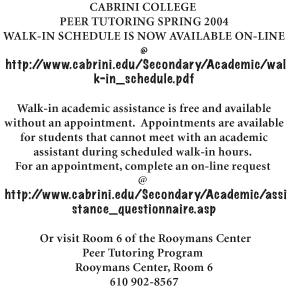
4 minute read
Injuries restrain athletes from gametime
CHRIS ROGERS STAFFWRITER CLR723@CABRINI EDU

Advertisement
As the cold, feverish winter months lose grasp to spring’s much anticipated climate, sounds of echoing bells announces a subtle launch towards physical improvement. During such a time, an increase in students will observably overflow the gym, linger the carpets with sweat and drain the water fountain of its valuable contents.
Though getting active for all the health benefits exercising has to offer, too often are sport injuries taken for granted. Surely, poor training practices, improper equipment use, lack of conditioning, and insufficient warm-up and stretching, are sufficient enough to disable your pre-summer training and leave you with nothing more than excruciating pain and winter fat.
Similarly to a non-typical weight bearer, athletes are equally at risk despite their intensive conditioning and discipline in the field thereof. This became evident to student Danielle Dorsey, a junior psychology major competing on the track team, as she strained her hamstring prior to an ECAC’s conference.
“I was warming up, doing the typical running and stretching when I strained my hamstring. I should have warmed up better,” Dorsey said. “I was in shock it hurt so much.”
Much like Dorsey, people are confronted to the same possibilities of injury whether competing in a sport or simply toningup for upcoming days at the beach. In Dorsey’s case, her lack of preparation prior to the race cost the team a loss, as the single replacement covered the spot for a missing team member.
According to Cabrini’s certif ied trainer, Jennifer Langley, treating sport injuries of this nature is no walk in the park. By use of an affective treatment, otherwise known as proprioception, the patient undergoes four stages of supervised rehabilitation. Depending on the form of injury, the procedure is modified to better the affected region. The first step consists of getting the muscle to fire, or in simpler terms, stimulating the injured limb. Secondly, the muscle is properly retrained in order to regain basic motor skills. Thirdly, the patient is put through specific exercises to strengthen the muscle. Lastly, the affected limb should have reached enough strength and flexibility to regain sport specific activities.
Unlike Dorsey, further signs of injuries remain unnoticed as teams scuffle their way through the remainder of the season, “All our sport teams are healthy,” Langley said. Nonetheless, her presence and expertise in the field of medical treatment is crucial to this well-being continuance, “There have been a few muscle-pulls and concussions. Aside from that athletes come in for ankle-taping before practices.”

According to Dorsey, Langley’s efforts and expertise as a trainer is greatly recognized and mostly appreciated. As she continues skipping through the pain of her strained hamstring, Dorsey said, “She’s really cares about the athletes and cares most about treating them and preventing further injury. She’s really good.”
Furthermore, unlike other staff members, Langley remains present to her position throughout the weekend, as she insures the safety of competing team members. For further needs or assistance, the training room is open from one to nine o’clock on weekdays and on weekends depending on gaming occurrences.
Men’s tennis sets sights on conference matches
Two trips to Hilton Head and Laguna Beach to give team experience to take on the PAC
ALYSSA SCHOENLEBER PERSPECTIVES & COPYEDITOR AMS725@CABRINI EDU
Having two trips under their belts, the Men’s Tennis team is hopeful for a PAC Championship.


Upon their return from winter break, the team began working with their trainer, Drew Wallace, and geared their focus towards physical fitness. “We have also been concentrating on taking an individual’s strength and basing an entire style of plan around their strength,” said Co-captain Michael Sofia, a senior political science major. “Each match coach is complemented on the ability this team has to play out each ball and really have the strength and endurance to remain 100 percent three hours into a match. We have Drew to thank for that,” said Sofia.
This preseason training would not only help them with preparation them for the season, but for their practice trips over spring and Easter breaks.
The team was looking forward to the warmer weather, but were even more eager to get the chance to get in more practice time outside, as they headed to Hilton Head, SC over spring break. “The South Carolina trip is always our time to build unity and morale amongst the players and this year was no different,” said Sofia. Matt Ingram, sophomore English/communications major, said not only did the trip get the team playing outside, but

Matt Ingram, sophomore English/communications major playing those tougher Division II teams “builds our confidence and energy to come back to Pennsylvania and dominate.”

Just a few weeks after their return from Hilton Head and after taking a win at home, 7-0, over Neumann College on March 21, the team again boarded another plane, this time to Laguna Beach, Calif. “We’re heading down there because it’s the week before we play some of the tougher teams in the PAC,” said Ingram. “The weather is more promising and we get to play some West Coast tennis.”
“We were excited to leave the West Coast with a win,” Sofia said.
The coaching staff, according to Sofia, “has been nothing short of amazing.” Players say the hiring of Rich Aldrete “really helped the team, physically and mentally. He’s able to build confidence in each of his players while helping all of us with our game.” Assistant Coach Scott Giblin, a former Cabrini Men’s Tennis captain, has “knowledge and understanding of not only the game but each of our games individually helps us improve with each match,” said Sofia.
“Our plans are simple, continue to work hard, train relentlessly and put in our practice time,” Sofia said. We want to “go out there each match and give it the best we have and hopefully win a PAC Championship,” said Ingram.

